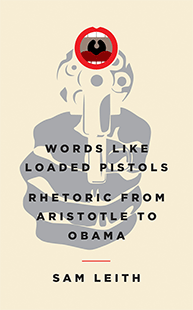Sean Ross Meehan
In this lively book, Sam Leith, London-based writer and former literary editor of the Daily Telegraph, takes aim at a popular misconception of rhetoric as “a dry, narrow, out-of-date academic subject.” Instead, Leith argues, and shows (the rhetorical concept here, we learn, is enargia), that “Rhetoric is everywhere language is, and language is everywhere people are…to understand rhetoric is in large part to understand your fellow human beings.”
Leith re-focuses our attention on the “everywhere” of rhetoric by exploring the basic and most familiar categories and terms of the academic subject by way of updated, if not unfamiliar, examples. In the first half, Leith organizes his discussion around the traditional five canons of rhetoric: invention, arrangement, style, memory, and delivery. In the second half, Leith explores the three traditional branches of rhetoric: forensic, deliberative, and epideictic. Along the way, there is a moderate amount of Greek terminology introduced, and recapitulated in his glossary. But this is no dusty rhetoric handbook, given the unusual range of examples Leith turns to for explication. For example, in his discussion of epideictic rhetoric (oratory focused on display), Leith takes as his text a rather crass song from the movie South Park to highlight the rhetorical figures of epistrophe, apostrophe, erotema (rhetorical question), digressio, and epizeuxis (extreme repetition), among others. Rhetoric, apparently, is everywhere and anywhere.
To my mind, Leith’s own rhetoric is most compelling in a series of interchapters that look at what he terms “champions of rhetoric,” popular rhetoricians throughout history and literature ranging from Satan to Cicero, from Lincoln to Obama. Leith’s chapter on Lincoln at Gettysburg is particularly engaging, and an apt model, since the plain-spoken Lincoln is not classically trained as is the primary speaker that day, Edward Everrett. However, Lincoln’s vernacular approach informed by the rhetoric of “everywhere language” carries into history, even if it doesn’t carry the day. Lincoln, Leith reminds us, is the sixth speaker on the bill.
In moments, Leith’s approach is too breezy; it left me wanting more scholastic engagement with the study of rhetoric, less of the pistol-shots of rhetoric in popular culture. But a study that can juxtapose Cicero and South Park is sure to invite a broader audience into an understanding of the rhetorical DNA of the world we think and speak everyday.
Sean Ross Meehan (ΦBK, Princeton University, 1991) is Associate Professor of English and Director of Writing at Washington College. He is a resident member of the Theta of Maryland Chapter of Phi Beta Kappa.




